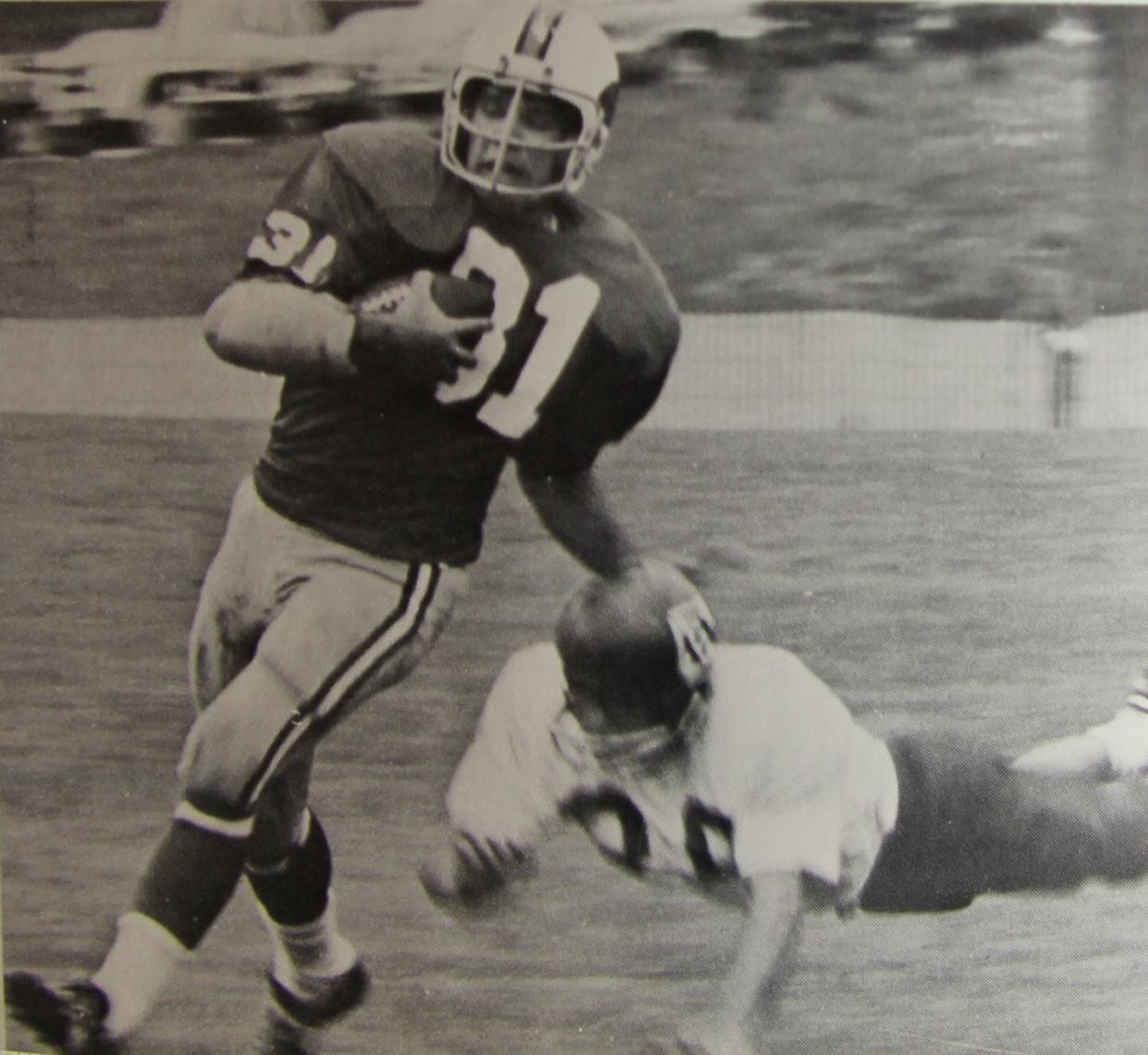Golden Scots: 'Plan B' leads to one of the greatest individual performances in Monmouth history

MONMOUTH — It’s been noted before in this history that coach Bill Reichow had several compelling options when deciding which skill player to use on plays from scrimmage.
Reichow also had options on special teams. Punt return responsibilities were usually in the very capable hands of Charlie Goehl – the all-time Midwest Conference record holder – while John Carter, perhaps the fastest football player in the league at the time, returned kickoffs. Both players were future M Club Hall of Famers.
But for at least one game, Reichow had to go with Plan B on kickoffs (albeit, choosing yet another Hall of Famer), and it led – along with a very memorable play from scrimmage – to one of the greatest individual performances in Monmouth football history, as the Fighting Scots defeated Ripon 40-30 to move to 8-0 on the season.
“Here’s the thing,” said Dennis Plummer, who was named the 1972 team’s MVP, earning Little All-American honors. “Reichow liked for little Johnny Carter to run back kickoffs. If my memory serves me correctly, he was hurt that game. So I was running back kicks, and it was the first time I’d done that all year. I did things a little differently than Carter. We had two basic kick returns, one to the right and one to the left. What I liked to do was something I learned in high school. If the return is going to the right, you take your first two steps to the left, and then you cut it back. And it just opened up for me like you’d diagram it on a board.”
Ninety-five yards later, Plummer was in the end zone, erasing Ripon’s second quarter 10-7 lead.
“Later, I almost broke it all the way again, but they caught up to me on that one and ran me down near the 20,” said Plummer,
“He was deceptively fast,” said Rod Davies. “You’d think he was just loping along, and then he’d find another gear.”
Beloit had certainly learned about Plummer’s deceptive speed the year before, when he broke loose for a 97-yard run from scrimmage, which remains Monmouth’s school record. It’s the longest run in Midwest Conference history over the past 60 years.
“He did what you asked all the time,” said Reichow. “He was a very dedicated individual. He could take a hit, and he could dish it out. He had good speed, and he had good physical toughness in tight spaces. He put a lot of hits on a lot of heads.”
Plummer returned the compliment.
“Coach Reichow was a hard worker,” said Plummer. “He was always looking at game film, and he just wanted us to be prepared. I think he was a lot like (Alabama coach) Nick Saban is now. He was well-prepared, he knew what the other team would be running, and he always had a good game plan. For other players, I know he was like a father figure, but I viewed him as Nick Saban is today – just a very well-prepared coach.”
“More than anything else, our special teams really came through for us that day,” said Paul Waszak. “Plummer made some things happen. He took us on his shoulders and willed us to that win.”
Still, the outcome was in doubt in the fourth quarter. But Plummer slammed the door on the Redmen’s hopes.
“We ran a lot of a play called ‘44 trap,’” said Bill Honeycutt. “I’m supposed to pull and trap the lineman or linebacker that comes through. We ran it earlier in the game, and Plummer got a nice gain, but he didn’t break it. He came back to the huddle and hit me on the helmet. He said, ‘You know, Honeycutt, if you’d done a better job of blocking your guy, I might’ve gone all the way.’”
“I haven’t thought about that in 50 years,” said Plummer, “but I do remember getting in his face about something.”
“About 20 plays later, we called the play again,” said Honeycutt. “I held onto my block longer that time, and that was the one he scored on.”
"I remember the Ripon game when Plummer ran wild,” said Tom Kratochvil, who recalled that on the play that broke the game open, Ripon made a change from its normal 5-2 defense.
“They were going to blitz, and there were four guys on my side, two linemen and two linebackers,” he said. “I’m thinking to myself, ‘This play’s dead.’ But I wish I had the game film, because it was probably the greatest block I ever made. I blocked down, and I just jammed up the hole and took out all four guys at once. All Plummer sees is a 10-yard wide hole. Bill Honeycutt was pulling on that play, and he must’ve gone 15 yards before he had a guy to block.”
Plummer recalled that despite the great blocking by linemen, he still needed one more bit of assistance on his 42-yard TD run.
“Steve Rueckert was in for Charlie Goehl on that play, and Steve loved blocking downfield,” said Plummer. “There was one guy left to beat, and when he took a step to his right, Steve just wiped him out. I went the other way and scored. The key to that trap play is to make a really good fake, and (quarterback) Tim Burk did. Ripon really honored the fake, and the play worked just like you’d diagram it.”
The Scots had opened a 40-24 lead, and they would leave Wisconsin with the outright MWC title.
This article originally appeared on Galesburg Register-Mail: NCAA Football: Glimpse at two memorable plays from Monmouth's win over Ripon in '72

